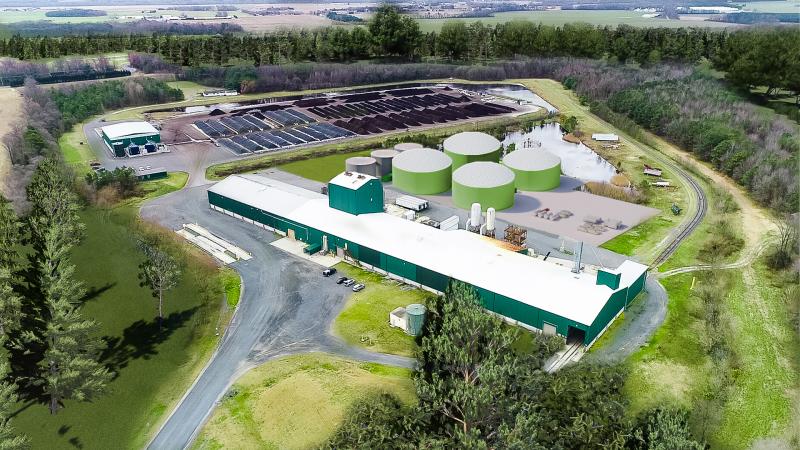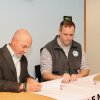Groups ask Carney to oppose Bioenergy Devco permits
Thirty-five groups from across the Delmarva region have issued a letter to Gov. John Carney urging his opposition to factory farm biogas infrastructure development moving forward in Delaware. The Bioenergy Devco poultry waste recycling plant along Route 13A near Seaford, which is currently seeking state permits, will be the first facility of its kind in the state and region. Groups claim the project is only the start of what could be a destructive regional industry buildout, if allowed to proceed unchecked.
Plans for the Bioenergy Innovation Center were approved April 20, 2021, by Sussex County Council.
In the letter, groups requested that Carney direct the Delaware Department of Natural Resources and Environmental Control to reject Bioenergy Devco’s sought-after permits and oppose all buildout of biogas infrastructure.
Letter signatories cited a host of concerns including:
Traffic and the safety of public roads: The methane refinery Bioenergy Devco has planned would bring at least 20,000 heavy-duty truck trips per year – or more than 50 every day – to local roads. A yet-undisclosed number of the trucks added to local roads would be hauling explosive gas.
Air quality: Biogas facilities emit smog-forming nitrogen oxides, ammonia and hydrogen sulfide. These chemicals are known to cause chronic lung disease and other respiratory ailments like asthma, and would directly affect health in nearby neighborhoods.
Water quality: The waste at biogas facilities inevitably seeps into the soil either through mismanagement at the site or land application to fields, and it has the potential to pollute local drinking water with nitrate contamination.
Environmental justice: The community surrounding the proposed facility is home to people of color at almost twice the rate of Sussex County as a whole, and home to people living in poverty at almost three times the rate of Sussex County as a whole.
“Delaware is facing the crises of a destructively expansive factory farm poultry industry and the imminent doom of the climate crisis. As they always do, Big Ag is looking to profit off the situation by peddling a false solution in factory farm biogas,” said Food & Water Watch Delaware organizer Greg Layton. “But make no mistake – factory farm biogas will do nothing to aid our poultry waste overload, and everything to further entrench both factory farms and fossil fuel infrastructure in our communities. Gov. Carney must say no to Bioenergy Devco and no to biogas.”
Among the groups are Sierra Club Delaware Chapter, Southern Delaware Alliance for Racial Justice, UFCW Local 27, Community Housing and Environment Connections, and Socially Responsible Agriculture Project.
Company responds to accusations
Sam Moller, spokesman for Bioenergy Devco, offered the following responses to the accusations:
Traffic and the safety of public roads:
Once fully operational, there will be on average 52 trucks coming in and out of the facility daily. Along with worker vehicles and vendors, there will be a total on average of 166 daily vehicle trips (both cars and trucks). This total falls well under the 200-vehicle threshold required for a traffic study. Currently, the company has 20 truck and 50 total vehicle trips per day. All these numbers have been reported and approved by Delaware Department of Transportation officials.
According to DelDOT data from 2020, the portion of Seaford Road next to the plant averages 3,403 vehicles per day. Also, Route 13 is right around the corner from the facility. That portion of the road averages 18,632 vehicles per day, with the portion by the intersection of Middleford Road and Route 13 averaging more than 30,000 vehicles per day.
As confirmed in documentation submitted to Sussex County, and as company officials have stated on the record on numerous occasions, there will be a maximum of three trucks per day transporting renewable natural gas. These vehicles are the same trucks used to transport gas across Delmarva.
“This is all to say our facility will have minimal, if any, impact on the traffic directly on Seaford Road and nearby intersections,” Moller said.
Air quality: The anaerobic digestion technology is a completely enclosed process that is monitored continuously with sensors, controls, and automation systems integrated throughout the plant. Bio-reactors and emissions scrubbing technology are used to ensure zero emissions.
Air samples from the digester are tested regularly to ensure the safety of the workforce and the local community.
Permits regulate all emissions, and the company will meet and exceed these standards, Moller said.
Water quality: The claim that the process will produce a by-product that is dangerous to public health is patently false, Moller said. At each facility, Bioenergy Devco constructs a wastewater treatment facility on-site that enables the facility to meet local and state effluent standards. The digestate is an organic soil amendment similar to compost. Based on local standards and nutrient management requirements, Bioenergy Devco manages total phosphorus as well as nitrogen content, creating a high-nutrient, beneficial soil amendment product.
Bioenergy Decco is applying for permits with DNREC that ensure adherence to state and local guidelines.
The process involves mixing the digestate with the existing composting operation. This compost is currently being sold to and used by nationally recognized brands as an essential part of their organics formulation, with an estimated 70 percent of the material leaving Delmarva.
Environmental justice: The site of Bioenergy Devco has been used in a large-scale poultry waste management capacity for more than 20 years and was owned by Perdue Farms. Bioenergy Devco now owns and operates this fully permitted composting facility, with local employees earning more than competitive wages. Based on approval of DNREC permits, there will be anaerobic digesters capable of managing roughly 200,000 tons of excess organic material from the local poultry industry as an environmentally smart alternative to land application, incineration and landfilling.
“Furthermore, we have hosted several community events and have invited our neighbors, community members, and local organizations to visit and tour the facility. With a commitment to the local Sussex County community, we have an open invitation to all community organizations and individuals who would like to connect with us and visit the plant,” Moller said.






















































